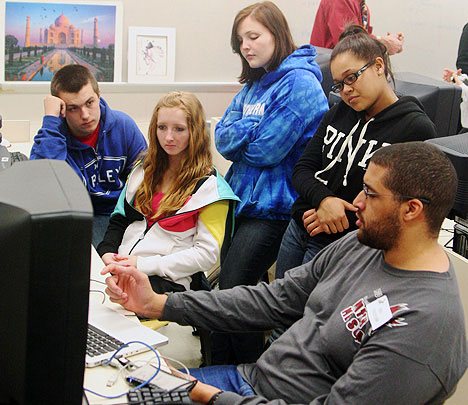By Carlton Koonce
Teen Mentoring Coordinator
The Durham VOICE
thedurhamvoice@gmail.com
The old saying goes give a man a fish, and he’ll eat for a day; but teach him to fish, and he’ll eat for a lifetime.
Communities are the same way.
They progress upward as they learn to depend on their own skills and qualities. Neighbors who know how, can teach those that don’t, leading to a better tomorrow for all.

NCCU grad David Fitts, right, works with staffers from The Round Table, the school newspaper of Northern High School in Durham, where VOICE staffers led journalism workshops on Friday, Jan. 27. (Staff photo by Carlton Koonce)
The word I think of is sustainability.
This month the VOICE celebrates its second birthday in print. And in this issue, our first of this new year, there are some examples of community sustainability — examples we see every day.
Our YO: Durham interns have explored some of these stories. They range from childhood love of volunteering turning into a dream job to a neighbor that once sustained the community through teaching and now continues supporting through regenerative gardening.
Although both stories highlight the significance of using local resources to restore community, both stories also underline maybe the most important resource the community has – its people.
From our high school writers this issue, we learn about sustaining the youngest generation by promoting the power of reading. Other stories from high school journalists spotlight how teens becoming active in politics can help shape their own educational future and also how steps have been taken to improve some local student testing scores.
As illustrated by Sharif Ruebin’s photograph of high schoolers adopting a highway, we see that teens embracing their community responsibilities (such as keeping roadways clean) aren’t … well, falling by the roadside.
Whether Wellons Village, East Durham, Walltown or any place in between, I think responsibility falls on community as a whole — schools, businesses, religious organizations and neighbors alike — when it comes to self-support.
As the calendar pages turn through 2012 and the VOICE ages another year, we continue to grow closer with our community and partners in a sustaining way. Our students, grassroots organizations and average Durham residents make this month’s birthday issue special because it helps to represent the symbiotic and mutually beneficial relationships taking place daily across town.
It’s these relationships among community members that lead to real sustainability.
As our partners help to uphold the VOICE in its responsibilities, we strive to do the same by bringing to attention these matters that can teach about the preservation of community assets. Our community, our times, our voices.
When I was a teen, in the not too distant past, I used to listen to stories my grandparents told about “back in the day.” Their communities struggled through the Depression and lived and fought through World War II during a time when radio, and yes, print newspapers, still reigned supreme.
This was during the time before mass supermarkets led to the demise of family gardens and when neighbors still conversed across yards while sitting on porches. It was an era when the milkman and iceman making deliveries and butchers carving meat knew the people they served.
Communities were tightly knit because without that sustainability they would have never survived.
Now, a couple of generations later, all the milkmen have vanished, but I think we’re coming full circle to those dusty times — times in which neighbors actually know each other.
While you read this issue, MLK service day has just passed, and African-American History month is here. Maybe it’s time to start thinking about what can be done to keep the community standing on its feet and to build on the many advances over the years for all people.
So, the VOICE is celebrating another birthday and continuously ponders its communal duties and responsibilities. I hope our readers learn more about their neighbors and remember that each relationship matters. Sustainability.
Onward and upward.